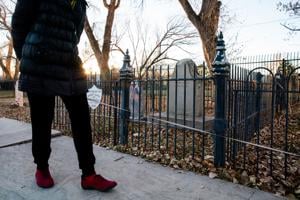Lifestyle
Taos Pueblo Proposes ‘Red Willow Park’ Name Change with Conditions

Taos Pueblo tribal leadership has proposed renaming Kit Carson Park to “Red Willow Park,” a name that reflects the cultural identity of the indigenous community. This suggestion, brought forth by the town’s Kit Carson Renaming Committee, will be presented to the town council during a special meeting on November 17, 2023. The committee has been engaged in discussions around renaming the park since 2011, aiming to replace a name that honors a controversial historical figure.
Historical Context and Community Involvement
The park is named after Christopher “Kit” Carson, a frontiersman who lived in Taos for 25 years. His legacy is complex, marked by both his role as a pioneer and his involvement in violent campaigns against Native American tribes, including the Navajo and Mescalero Apache. Despite being celebrated in various places, including the Carson National Forest, his name has become increasingly contentious, prompting discussions about the appropriateness of his commemoration.
In a recent committee meeting held on October 23, 2023, members received a letter from the Taos Pueblo Tribal Council, outlining six conditions necessary for accepting the proposed name. Committee Chair and town Councilor Genevieve Oswald expressed optimism about the committee’s efforts, stating, “All six of those points can be met. This was just the door opening.”
Tribal Secretary Jeremy Lujan, along with Second Tribal Sheriff Jesse Winters, emphasized the need for meaningful change. Lujan articulated the deep connection the Tiwa people have with the land, saying, “This valley is not a place we occupy — it is who we are.” He underlined the historical significance of the land, asserting, “We did not lawfully transfer our homeland to another nation.”
Conditions for Renaming and Community Perspectives
The letter from the Tribal Council criticized the current renaming process as failing to fully include the voices of the indigenous community. It described a pattern where well-meaning initiatives often exclude the original inhabitants of the land, stating, “Decisions made about us without us.” The letter called for a more inclusive and respectful approach to renaming public spaces.
Oswald acknowledged the importance of deeper social change, stating, “Changing the name does nothing to change the relationship.” The sentiment echoed throughout the committee, with members recognizing that a name change alone may be insufficient without accompanying actions that foster genuine healing and understanding.
Members of the Taos Pueblo, including Dr. Christina M. Castro and Turquoise Chenoa Velarde, expressed concerns that the proposed change could be merely performative. Castro suggested the name “The People’s Park” as a more meaningful alternative, highlighting the need to address names that dehumanize indigenous people. Velarde, who has personal ties to the legacy of Kit Carson, urged for a more profound commitment to justice and historical acknowledgment, stating, “We need people who are ready to do more than clap for justice.”
Velarde also responded to a common argument against renaming, which posits that removing Carson’s name could erase an opportunity to discuss historical injustices. She argued that educational initiatives and contextual discussions could still take place, allowing for a balanced historical narrative without glorifying figures associated with harm.
The Tribal Council’s letter concluded by highlighting the significance of names in shaping public memory. It stated, “When a name is given to a place in the public sphere, it frames what people remember, who is visible, and whose authority is assumed.” In an era where the re-examination of historical figures is increasingly prevalent, the ongoing discussions in Taos reflect a broader movement towards recognizing and honoring indigenous perspectives.
The upcoming town council meeting will provide a platform for these discussions to continue, as the community seeks to navigate the complexities of historical legacy and the importance of inclusive dialogue.
-

 Sports3 weeks ago
Sports3 weeks agoSteve Kerr Supports Jonathan Kuminga After Ejection in Preseason Game
-

 Top Stories1 week ago
Top Stories1 week agoMarc Buoniconti’s Legacy: 40 Years Later, Lives Transformed
-

 Business3 weeks ago
Business3 weeks agoTyler Technologies Set to Reveal Q3 2025 Earnings on October 22
-

 Science3 weeks ago
Science3 weeks agoChicago’s Viral ‘Rat Hole’ Likely Created by Squirrel, Study Reveals
-

 Politics3 weeks ago
Politics3 weeks agoDallin H. Oaks Assumes Leadership of Latter-day Saints Church
-

 Lifestyle3 weeks ago
Lifestyle3 weeks agoDua Lipa Celebrates Passing GCSE Spanish During World Tour
-

 Entertainment3 weeks ago
Entertainment3 weeks agoZoe Saldana Advocates for James Cameron’s Avatar Documentary
-

 Lifestyle3 weeks ago
Lifestyle3 weeks agoKelsea Ballerini Launches ‘Burn the Baggage’ Candle with Ranger Station
-

 Sports3 weeks ago
Sports3 weeks agoPatriots Dominate Picks as Raiders Fall in Season Opener
-

 Health3 weeks ago
Health3 weeks agoRichard Feldman Urges Ban on Menthol in Cigarettes and Vapes
-

 Business3 weeks ago
Business3 weeks agoMega Millions Jackpot Reaches $600 Million Ahead of Drawings
-

 World3 weeks ago
World3 weeks agoD’Angelo, Iconic R&B Singer, Dies at 51 After Cancer Battle









